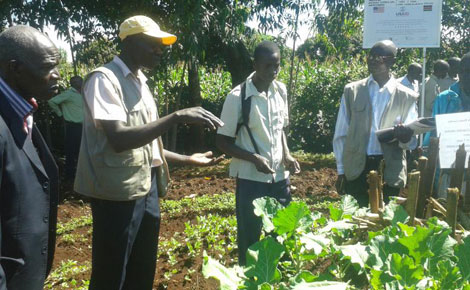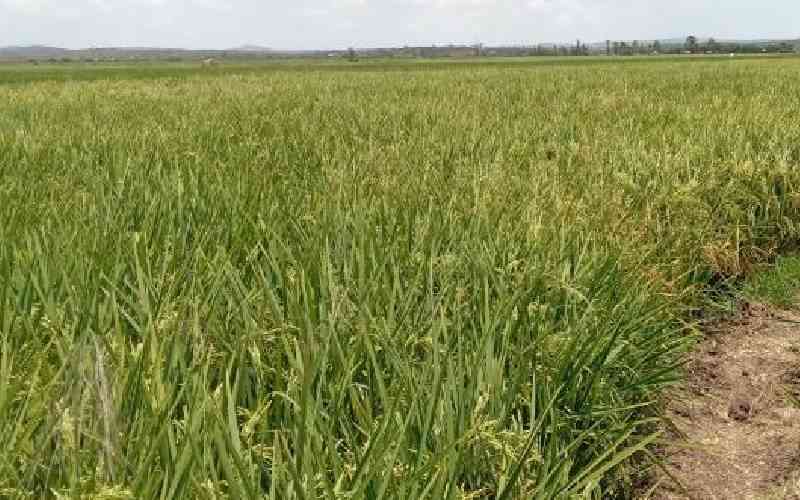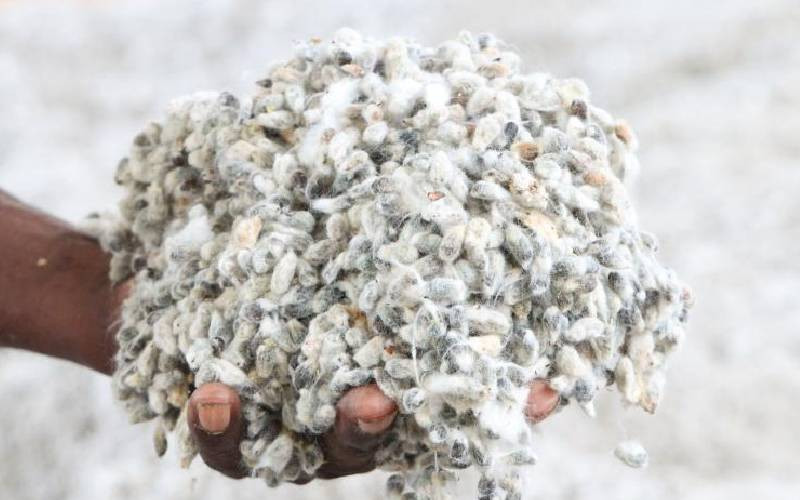 |
|
Nixon Nyaure (in a cap) farmer and Nyahera commercial village facilitator take farmers through his farm and a section of his produce in Nyahera, Kisumu County. (Photo: Kevine Omollo/Standard) |
Nyahera village in Kisumu County is one of the fairly favourable areas for farming in the county, given its fairly adequate rainfall and soil fertility.
However, ignorance and lack of motivation have left most farms idle every planting season with most residents growing less than their domestic need and later depending on food supply from other regions.
The low income from the farms is seen to push most people who have abandoned agriculture to selling their lands to foreigners who are positioning themselves for the expanding Kisumu City. For Nixon Nyaure, crop farming was until 2010 a domestic affair and part-time activity.
Collective farming
However, after attending trainings by Kenya Horticultural Competitiveness Project (KHCP), Nyaure and other 50 farmers were introduced to modern farming. He has now ventured into capacity building to have more farmers adopt the ideas he has since gathered.
One acre farm used for training and exhibition now stand tall and the heart of the village and has been used every month to train more farmers. Nyaure’s one-acre farm has become his only source of income as he harvests twice every year from it.
In 2012, he was to recruit more farmers from the area to attend a training which was to be done in phases, on proper use of the land and subsequent management practices to ensure maximum produce.
“At first I was skeptical because I was not sure whether it was possible to consider farming as my full time job given the poor history of farming in the area but I thank God they convinced me and I changed my mind,” Nyaoro tells the Smart Harvest at his home in Nyahera Village.
KHCP, however, won some hearts through Nyauri who later became team leader.
“KHCP advised me to mobilise 50 other people and they gave us comprehensive training, seeds and fertiliser to set us off,” he says.
He says the group also trained them on collective farming in which they were expected to jointly work on certain farms apart from their own farms which they also cultivated.
Since the harvesting season also fall within the same time, the farmers now market jointly, a situation Nyaure says has been their strength in the market trends.
“Previously we used indigenous seeds, some of which were produce from our previous harvests, we never knew the existence of fertiliser nor the appropriate spacing and inter cropping but we can now proudly say we are headed to a brighter future in farming,” says Nyaure.
Most of their horticultural produce find their way into the local market, but the over 170 farmers who have formed a Community Based Organisation (CBO) named Nyahera Commercial Village now focuses on developing value addition so as to supply the produce to other parts of the country.
Active production
Stay informed. Subscribe to our newsletter
“We have fruits, tubes cereals and fodder in plenty and we need to have value addition site so as to allow farmers to maximise from their produce and also expand job opportunities in the area. We are yet to get any support to enable us to achieve this,” adds Nyaure.
Initially, he spent over 80 per cent of his income buying food, a situation which left him with little to invest in other activities.
He previously produced maize, beans, cassavas and kales which only sustained his kitchen for months before he could resort to purchases again.
“I used to get less than one sack of maize from my one acre farm where I now get over eight sacks and several other crops from the same piece of land,” says Nyaure.
He has since expanded his farming, taking the activity as a full time job after it proved more profitable than the other casual jobs he had been engaged in before.
Today over ten other similar groups have joined Nyaure’s group, with a membership of over 100 people and over 300 acres of land in active production.
Every month, Farm Concern International (FCI) through the support of United States Agency for International Development (USAID) a forum in which the farmers exhibit their products and get updated on the new trends in the agricultural field.
According to Jared Kassam, Programme Manager at FCI, convincing more farmers to embrace the idea has been the biggest challenge but more efforts are being made to expand the project.
“Farmers have ventured into a number of crops and livestock which has enabled all the farmers we work with to take up the farming as a full time job and this means it is viable,” says Kassam.
 The Standard Group Plc is a
multi-media organization with investments in media platforms spanning newspaper
print operations, television, radio broadcasting, digital and online services. The
Standard Group is recognized as a leading multi-media house in Kenya with a key
influence in matters of national and international interest.
The Standard Group Plc is a
multi-media organization with investments in media platforms spanning newspaper
print operations, television, radio broadcasting, digital and online services. The
Standard Group is recognized as a leading multi-media house in Kenya with a key
influence in matters of national and international interest.
 The Standard Group Plc is a
multi-media organization with investments in media platforms spanning newspaper
print operations, television, radio broadcasting, digital and online services. The
Standard Group is recognized as a leading multi-media house in Kenya with a key
influence in matters of national and international interest.
The Standard Group Plc is a
multi-media organization with investments in media platforms spanning newspaper
print operations, television, radio broadcasting, digital and online services. The
Standard Group is recognized as a leading multi-media house in Kenya with a key
influence in matters of national and international interest.









